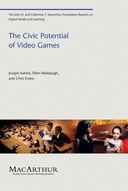Explore

The Civic Potential of Video Games
0 Ungluers have
Faved this Work
Login to Fave
This report focuses on the civic aspects of video game play among youth. According to a 2006 survey, 58 percent of young people aged 15 to 25 were civically "disengaged," meaning that they participated in fewer than two types of either electoral activities (defined as voting, campaigning, etc.) or civic activities (for example, volunteering). Kahne and his coauthors are interested in what role video games may or may not play in this disengagement.Until now, most research in the field has considered how video games relate to children's aggression and to academic learning. Digital media scholars suggest, however, that other social outcomes also deserve attention. For example, as games become more social, some scholars argue that they can be important spheres in which to foster civic development. Others disagree, suggesting that games, along with other forms of Internet involvement, may in fact take time away from civic and political engagement. Drawing on data from the 2006 survey, the authors examine the relationship between video game play and civic development. They call for further research on teen gaming experiences so that we can understand and promote civic engagement through video games.
This book is included in DOAB.
Why read this book? Have your say.
You must be logged in to comment.
Rights Information
Are you the author or publisher of this work? If so, you can claim it as yours by registering as an Unglue.it rights holder.Downloads
This work has been downloaded 39 times via unglue.it ebook links.
- 39 - pdf (CC BY-NC-ND) at Unglue.it.
Keywords
- Education
- Educational equipment & technology, computer-aided learning (CAL)
- Educational equipment and technology, computer-aided learning (CAL)
- Impact of science & technology on society
- Impact of science and technology on society
- Mathematics & science
- Science: general issues
- Society & Social Sciences
Links
DOI: 10.7551/mitpress/8518.001.0001Editions

